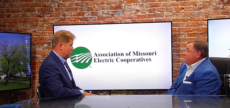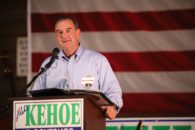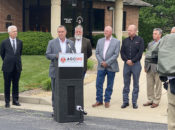JEFFERSON CITY, Mo. – Amid all the talk of “corrupt” politicians, gun rights and television ads, there hasn’t been much discussion during the governor’s race of a subject that directly affects most Missourians every day and will likely be a crucial element of the next governor’s tenure: transportation infrastructure.
The state ranks 7th in the country in the size of its transportation system but 46th in terms of funding.
According to the Department of Transportation, 60 percent of the state’s bridges are older than their intended lifespan of 50 years and there aren’t enough resources to repair or replace all of them. The state auditor ranks Missouri 33rd in the nation at replacing bridges.
Driving through the state’s highways often means encountering potholes and crumbling roads, even on interstates, as the state’s bus-touring candidates can attest.
Democrat Chris Koster has promised to find a funding solution for the problem by 2018, saying the problem will only get worse.
“For the last two years, the Department of Transportation has been downsizing. MODOT laid off 1200 workers, sold over 700 pieces of large equipment, closed 124 maintenance barns, and shut down three large division offices in Willow Springs, Macon, and Joplin,” said David Turner, a campaign spokesman.
He said these cuts show that wasteful spending is no longer an issue and that Koster will focus on finding a bipartisan legislative solution in 2017.
“At this point, eliminating “wasteful spending” will not solve the problem. Chris Koster knows that as soon as the election is over, members of both parties will need to come together to find a bipartisan funding solution to fill the $200-$500 million annual hole that has accumulated in the Department of Transportation budget,” he said.
But how likely is such a solution? A gas tax proposal that would have allowed voters to approve an increase made it out of the Senate and its House committee, but never received a vote on the House floor.
There’s bipartisan support for increasing the gas tax, but some in leadership are wary of passing a tax increase. Other Republicans think there are better ways to fund the roads.
Rep. Rick Brattin, R-Harrisonville, has proposed using money spent on tax credits to fund transportation instead.
“Right now in the state, about $550 million [of tax credits] are redeemed per year,” he told the Missouri Times during session. “We can’t fund transportation, but we can fund these tax credit programs.”
Brattin’s proposal would have set up a committee to decide what it takes to fully fund transportation. Tax credits would not be able to be released or granted until that number was met.
That plan could take a while to bear fruit. Because of the structure of programs that provide targeted tax cuts for economic development it would be nearly 10 years before the first savings would be reflected in the budget.
With a lot of factors in play, Koster also seems to be prepared if the legislature can’t come to an agreement in 2017. His campaign said he’ll turn to the initiative petition process.
“If lawmakers in Jefferson City cannot find a compromise in the Spring of 2017, Chris will bring leaders together to get a funding proposal on the ballot in 2018,” Turner said.
Koster’s opponent, Eric Greitens, has called for a full study of the problem.
“I think what we need to is do a full study of all the infrastructure needs,” he told the Springfield News-Leader earlier this month.
The Greitens campaign did not respond to the Missouri Times request for information about how he would address the transportation issue.
Greitens indicated to the News-Leader that he would model his plan after a solution passed in South Carolina this year.
With most Missourians using roads every day to drive to work or school and the state’s geographic location making it a key part of national trucking routes, transportation funding will be a prominent issue for the next administration.












